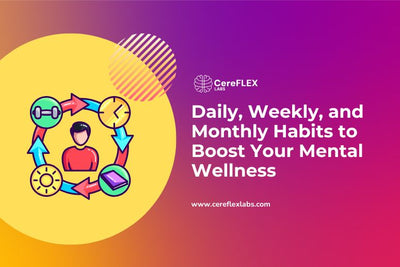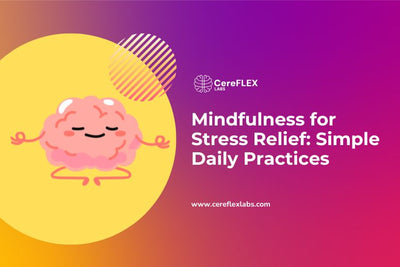In today’s fast-paced world, the ability to learn efficiently and excel academically is no longer optional—it’s essential. Whether you’re a student preparing for exams, a professional acquiring new skills, or a teacher striving to enhance clarity, improved mental performance is a universal need.
This is where nootropics come in. These natural supplements, often called "brain boosters," are designed to enhance memory, focus, and learning capabilities. With so many options available, how do you choose the right ones?
In this guide, we’ll explore the best nootropics for learning and academic success. You’ll learn how these cognitive enhancers work, their unique benefits, and how to incorporate them into your study routine. Unlock your potential and take the next step in your academic journey with the power of nootropics!
Here is the Quick Answer |
|
Nootropics are natural supplements that boost memory, focus, and learning—perfect for students and lifelong learners. Top picks include Bacopa Monnieri for memory, L-Theanine for calm focus, Rhodiola Rosea for stress relief, Ginkgo Biloba for blood flow, and Lion’s Mane Mushroom for brain cell growth. Use them wisely with good habits and consult a healthcare professional for best results. |
What are nootropics?
Nootropics are natural or semi-synthetic compounds designed to enhance brain function. Often referred to as cognitive enhancement supplements or "smart drugs," these substances aim to improve mental abilities such as memory, focus, creativity, mood, and motivation.
Nootropics come in various forms, including prescription medications and over-the-counter options. Whether you’re looking to boost learning, improve concentration, or stay motivated, nootropics offer potential benefits to enhance cognitive performance.
How Nootropics Work: Mechanisms of Action
Nootropics enhance brain function by supporting the brain's natural processes, rather than directly releasing neurotransmitters or binding to receptors. Here’s how they work:

Improved Brain Energy Supply
Nootropics increase access to glucose and oxygen—critical fuels for brain activity. This enhanced energy boosts focus and mental stamina, especially during demanding tasks.
Antihypoxic and Neuroprotective Effects
These compounds protect the brain from low oxygen levels and harmful agents, increasing resilience to stress and supporting long-term cognitive health.
Support for Cellular Health
Nootropics aid in the production of proteins and nucleic acids in neurons, promoting brain cell growth and repair. They also improve the metabolism of phospholipids in cell membranes, enhancing communication between cells.
Combating Oxidative Stress
By acting as antioxidants, nootropics remove free radicals that can damage brain cells. This reduces oxidative stress, a major contributor to aging and cognitive decline.
Improved Blood Flow and Oxygen Delivery
Nootropics improve red blood cell flexibility, ensuring better blood flow and oxygen delivery to the brain. This optimizes nutrient absorption and cognitive performance.
Long-Term Metabolic Activity
Many nootropics require consistent use over time to show results. They gradually improve brain metabolism, providing stable, long-lasting cognitive benefits.
Blood–Brain Barrier Penetration
For nootropics to be effective, they must cross the blood-brain barrier, allowing them to directly influence brain cells and their functions.
What are the most effective nootropics for studying?
Nootropics are powerful tools for improving thinking, memory, and focus, making them especially valuable for students and lifelong learners. These supplements can enhance mental clarity, boost retention, and improve concentration during study sessions or exams.
In this guide, we’ll explore some of the most effective nootropics, their benefits, and how to incorporate them into your study routine to maximize academic performance.

1- Bacopa Monnieri
Bacopa monnieri is a widely respected herb known for its ability to enhance memory and cognitive function, making it an excellent choice for students and lifelong learners.
Why it’s effective
Bacopa improves memory retention and recall, helping students process and retain large amounts of information. It also accelerates information processing, making it easier to grasp new concepts.
Imagine preparing for exams and effortlessly recalling everything you’ve studied—Bacopa can make that possible.
Mechanism of Action
Bacopa monnieri supports brain health in several ways:
- Increases acetylcholine levels, which are critical for memory and learning.
- Reduces oxidative stress, protecting nerve cells from damage.
- Improves mitochondrial function, boosting energy for brain activity.
- Encourages dendrite growth, leading to stronger neural connections.
- Balances neurotransmitters like GABA and serotonin, enhancing mood and overall cognitive performance.
Dosage
The typical recommended dosage is 300–600 mg daily.
Side Effects
Bacopa is generally safe, but mild side effects like stomach cramps, nausea, or dry mouth may occur in some users.
2- L-Theanine
L-Theanine, a natural compound found in green tea and caffeine-free teas, is a powerful aid for students seeking calm and focused concentration.
Why it’s effective
L-Theanine promotes relaxation without causing drowsiness, making it ideal for long study sessions or exam preparation. When combined with caffeine, it reduces jitteriness while providing steady and sustained focus.
Mechanism of Action
L-Theanine enhances cognitive performance by:
- Increasing serotonin, dopamine, and GABA levels, neurotransmitters known as "happy hormones."
- Regulating mood, focus, and alertness while reducing fear and stress.
- Helping to balance nerve signals, which improves overall mental clarity and calmness.
Dosage
The recommended dosage ranges from 200–400 mg daily, typically taken for 4–8 weeks.
Side Effects
L-Theanine is generally safe, but mild side effects like headaches or drowsiness may occur. Long-term safety has not been fully established.
3- Rhodiola Rosea
Rhodiola Rosea is a powerful adaptogen that enhances focus and reduces stress,4 making it especially beneficial for students managing heavy coursework or exam pressure.
Why it’s effective
Rhodiola combats stress and fatigue, helping you stay focused and energized during long study sessions or when tackling complex subjects. It increases mental stamina, making it a natural ally for peak academic performance.
Mechanism of Action
Rhodiola Rosea supports mental and physical health by:
- Regulating genes that influence immunity, brain function, and blood vessel health.
- Enhancing memory, focus, and mental clarity, particularly under stress.
- Reducing anxiety, depression, and aggression for clearer thinking.5
- Boosting metabolism, heart health, energy, and endurance, improving performance under pressure.
Dosage
The typical dosage is 100–600 mg daily, taken for up to 12 weeks.
Side Effects
Rhodiola is generally well-tolerated, but some users may experience mild side effects such as dizziness, dry mouth, or increased saliva production.

4- Ginkgo Biloba
Ginkgo Biloba, derived from one of the world’s oldest tree species, is renowned for enhancing memory and focus.
Why it’s effective
Ginkgo increases blood flow to the brain, improving mental clarity and focus—essential for processing complex study materials. It also enhances memory, helping students recall information more effectively during exams or while learning new concepts.
Imagine your brain feeling sharper and more active during study sessions—Ginkgo acts as a natural booster, making your learning process more efficient.
Mechanism of Action
Ginkgo Biloba supports cognitive function by:
- Reducing oxidative stress and protecting nerve cells from damage.
- Increasing blood flow to the brain for improved mental clarity and focus.
- Boosting communication between brain cells through elevated levels of serotonin, dopamine, and norepinephrine.
- Supporting memory and thinking by enhancing cholinergic activity and reducing platelet clumping, which benefits overall brain health.
Dosage
The recommended dosage is 60–240 mg daily, typically taken for up to 6 months.
Side Effects
Ginkgo is generally safe, but mild side effects like stomach upset, headaches, dizziness, or skin allergies may occur. It may also increase the risk of bruising, bleeding, or irregular heartbeats in some individuals.

5- Lion’s Mane Mushroom
Lion’s mane Mushroom is not just a culinary delight—it’s also a powerful brain booster, making it an excellent choice for students aiming to improve focus and learning.
Why it’s effective:
-
Supports Brain Cell Growth: Lion’s mane promotes the growth of brain cells, enhancing focus and memory, which are critical for studying.
-
Enhances Neuroplasticity: It helps the brain adapt and form new neural connections, a key factor in learning new concepts and retaining information.
Mechanism of Action
Lion’s mane mushroom stimulates the production of Nerve Growth Factor (NGF), a protein essential for the growth and repair of nerve cells. It supports:
- The creation of new neurons and stronger neural connections, improving memory and learning.
- Brain protection through its antioxidant and anti-inflammatory properties, reducing cell damage and supporting long-term brain health.
Dosage
A typical dosage is 1 gram per day for up to 16 weeks. Always follow product guidelines and consult a healthcare professional for personalized advice.
Side Effects
Lion’s mane is generally safe, but mild stomach discomfort may occur in some individuals.
Practical Guidance for Using Nootropics
To maximize the benefits of nootropics while minimizing risks, follow these practical tips:
Start Low and Go Slow: Begin with a low dose and gradually increase it, following the recommended guidelines. Monitor for side effects and avoid taking nootropics excessively by using them in cycles.
Timing is Key
- Take fast-acting nootropics like caffeine or L-Theanine 30–60 minutes before studying for immediate effects.
- For slow-acting nootropics like Bacopa monnieri, use them consistently over weeks to gain long-term cognitive benefits.
- Avoid stimulating nootropics late in the day to prevent sleep disturbances.
Combine with Healthy Habits: Pair nootropics with good nutrition, regular exercise, and adequate sleep for optimal results. Incorporate them into your pre-study routine and track their effects to find the combination that works best for you.
Consult a Healthcare Provider: Always speak with a healthcare professional before starting nootropics, especially if you have existing health conditions or are on medications. They can recommend safe doses and help monitor your progress.
Why Choose CereFLEX Labs for Your Nootropic Needs?
CereFLEX Labs offers science-backed, natural solutions designed to enhance memory and cognitive function in adults. Our products are formulated with high-quality ingredients, which are carefully tested to ensure safety and effectiveness.
With our AM/PM protocol, you can support cognitive health around the clock—boosting focus and energy during the day while promoting recovery and repair at night. Whether you’re tackling a demanding workload or striving for peak academic performance, CereFLEX Labs provides the tools you need to unlock your full potential.
Conclusion
Enhancing your learning and academic performance doesn’t have to be a challenge. Nootropics, backed by science, offer effective ways to improve memory, focus, and overall brain health.
Natural options like Bacopa monnieri and lion’s mane mushroom, or synergistic combinations such as L-Theanine and caffeine, can boost study efficiency and mental clarity, helping you excel in your academic journey.
At CereFLEX Labs, we provide research-backed, safe, and effective solutions to support your cognitive health. Explore our Brain Health Supplements today and take the first step toward unlocking your full potential.
FAQs
1. How do nootropics improve learning abilities?
Nootropics enhance focus, memory, and cognitive processing by optimizing neurotransmitter function and increasing blood flow to the brain.
2. Are natural nootropics safe for students?
Yes, natural nootropics are generally safe when taken at recommended doses, but safety depends on individual tolerance and potential interactions with medications.
3. Can nootropics be combined for better academic performance?
Yes, stacking combinations like caffeine and L-Theanine can be effective, but it’s important to use them carefully to minimize the risk of side effects.






